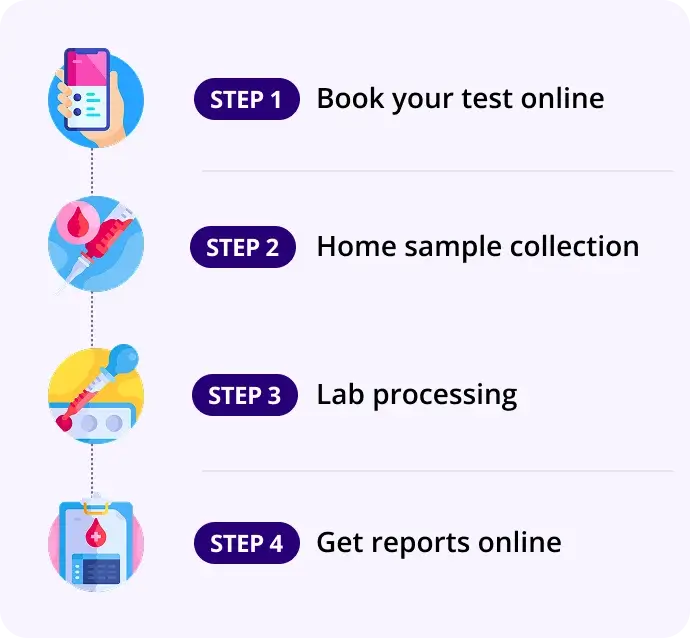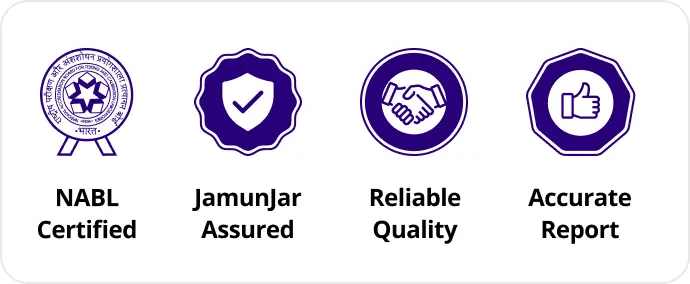Search for
Lithium
Hormone/ Element
Report in 4Hrs
At Home
No Fasting Required
Details
Lithium test measures the amount of lithium in the blood
₹219₹495
56% OFF
FREE:
Ai Insights
Lithium Test Information Guide
- Why is it done?
- Monitors therapeutic levels of lithium, a medication commonly prescribed for bipolar disorder and mood stabilization
- Ensures medication effectiveness while preventing toxic accumulation in the body
- Initial testing performed 5-7 days after starting lithium therapy to establish baseline levels
- Routine monitoring performed every 3-6 months during maintenance therapy, or as clinically indicated
- Urgently performed when toxicity symptoms appear (tremors, confusion, nausea, diarrhea, or neurological changes)
- Assesses renal and thyroid function for early detection of lithium-related complications
- Normal Range
- Therapeutic Range: 0.6-1.2 mEq/L (millequivalents per liter) for maintenance therapy 0.8-1.4 mEq/L during acute mania treatment
- Untreated/Below Therapeutic: Less than 0.6 mEq/L indicates insufficient medication levels for therapeutic benefit
- Supratherapeutic: 1.5-2.0 mEq/L may cause mild toxicity symptoms; requires dose adjustment
- Toxic Level: Greater than 2.0 mEq/L represents serious toxicity requiring immediate intervention
- Units of Measurement: mEq/L (millequivalents per liter) or mmol/L (millimoles per liter)
- Interpretation Note: Normal range refers to therapeutic levels when lithium is being used medically; levels outside therapeutic range may be abnormal regardless of patient symptoms
- Interpretation
- Therapeutic Range (0.6-1.2 mEq/L): Indicates appropriate medication dosing with optimal balance between efficacy and safety; patient tolerating therapy well with expected mood-stabilizing benefits
- Low Level (<0.6 mEq/L): Medication may be ineffective; symptoms of bipolar disorder may not be controlled; dose adjustment may be necessary; poor medication adherence should be assessed
- Borderline High (1.3-1.5 mEq/L): Approaching toxic levels; mild side effects may develop; close monitoring recommended; consider dose reduction if side effects present
- Supratherapeutic (1.5-2.0 mEq/L): Mild to moderate toxicity risk; symptoms may include coarse tremor, confusion, diarrhea, nausea, or polyuria; dose reduction essential; consider temporary dose hold
- Toxic Level (>2.0 mEq/L): Severe toxicity requiring immediate medical attention; risk of serious neurological complications, cardiac arrhythmias, renal damage, and death; medication must be discontinued immediately
- Factors Affecting Results: Dehydration increases levels; adequate hydration decreases levels; sodium depletion increases lithium retention; NSAIDs, ACE inhibitors, and diuretics elevate lithium; thyroid dysfunction affects metabolism; renal impairment increases accumulation; diet high in sodium reduces levels
- Clinical Significance: Regular monitoring is critical as lithium has narrow therapeutic window; small changes in dose produce significant level changes; individual variation in response requires personalized dosing; timing of blood draw important (typically 12 hours post-dose for trough level)
- Associated Organs
- Primary Systems Involved:
- Central Nervous System: Primary organ system lithium affects; used to stabilize mood and prevent manic episodes
- Kidneys: Major site of lithium excretion; prolonged use can cause chronic kidney disease, nephrogenic diabetes insipidus, or acute tubular necrosis
- Thyroid Gland: Lithium inhibits thyroid hormone synthesis; can cause hypothyroidism in 20-30% of patients on long-term therapy
- Heart: Toxic levels can cause cardiac arrhythmias, myocarditis, and conduction abnormalities
- Gastrointestinal System: Nausea, vomiting, diarrhea, and abdominal discomfort common side effects especially with elevated levels
- Associated Conditions and Complications:
- Bipolar disorder (indication for therapy)
- Major depressive disorder (adjunctive treatment)
- Lithium toxicity syndrome with neurological, cardiac, and renal manifestations
- Nephrogenic diabetes insipidus from chronic lithium exposure
- Hypothyroidism or thyroid dysfunction
- Chronic kidney disease
- Tremor and movement disorders at elevated levels
- Cognitive impairment and memory issues with supratherapeutic levels
- Primary Systems Involved:
- Follow-up Tests
- Routine Monitoring Tests:
- Repeat lithium level testing every 3-6 months during stable maintenance therapy
- Serum creatinine and Blood Urea Nitrogen (BUN) to assess renal function; performed every 6-12 months
- Thyroid Stimulating Hormone (TSH) to screen for lithium-induced hypothyroidism; performed annually or if symptoms develop
- Estimated Glomerular Filtration Rate (eGFR) for comprehensive renal assessment
- Tests for Elevated or Toxic Levels:
- Electrocardiogram (ECG) to assess for cardiac effects if level exceeds 1.5 mEq/L
- Comprehensive metabolic panel to evaluate electrolytes and kidney function in toxicity
- Neurological examination if toxicity symptoms present (confusion, tremor, ataxia)
- Brain imaging (CT or MRI) if severe neurological symptoms or altered mental status develops
- Tests Before Starting Lithium (Baseline):
- Comprehensive metabolic panel including electrolytes, kidney function
- TSH level to establish baseline thyroid function
- Urinalysis to assess baseline kidney and urinary system function
- ECG if patient over 40 years old or has cardiac risk factors
- Related Complementary Tests:
- Free T4 and T3 if TSH abnormal to diagnose lithium-induced thyroid dysfunction
- 24-hour urine lithium clearance if evaluating for nephrogenic diabetes insipidus
- Sodium and potassium levels if toxicity suspected (hyponatremia increases lithium levels)
- Routine Monitoring Tests:
- Fasting Required?
- Fasting: No fasting is required for lithium level testing
- Timing of Blood Draw: Critical parameter - blood should be drawn 12 hours after the last dose (trough level) for accurate therapeutic drug monitoring; alternative timing (8 hour post-dose) may be used if consistently applied for monitoring
- Timing of Initial Test: First lithium level should be checked 5-7 days after starting medication to allow steady state; earlier testing does not accurately reflect therapeutic levels
- Medications to Manage:
- Do NOT discontinue lithium before testing (unless directed by healthcare provider for toxicity evaluation)
- Inform laboratory technician of other medications: NSAIDs, ACE inhibitors, thiazide diuretics, and loop diuretics can elevate lithium levels
- Continue medications as prescribed; do not adjust without consulting healthcare provider
- Other Patient Preparation:
- Maintain adequate hydration before testing; dehydration artificially elevates lithium levels
- Maintain consistent sodium intake; very low sodium diet increases lithium levels
- Take lithium dose at consistent time each day; do not skip doses before testing
- Inform healthcare provider of any changes in medication regimen, kidney function, thyroid status, or recent illness before testing
- Wear comfortable clothing with easily accessible arms for blood draw
- If experiencing toxicity symptoms (tremor, confusion, nausea, severe diarrhea), seek immediate medical attention before regular scheduled test
How our test process works!

